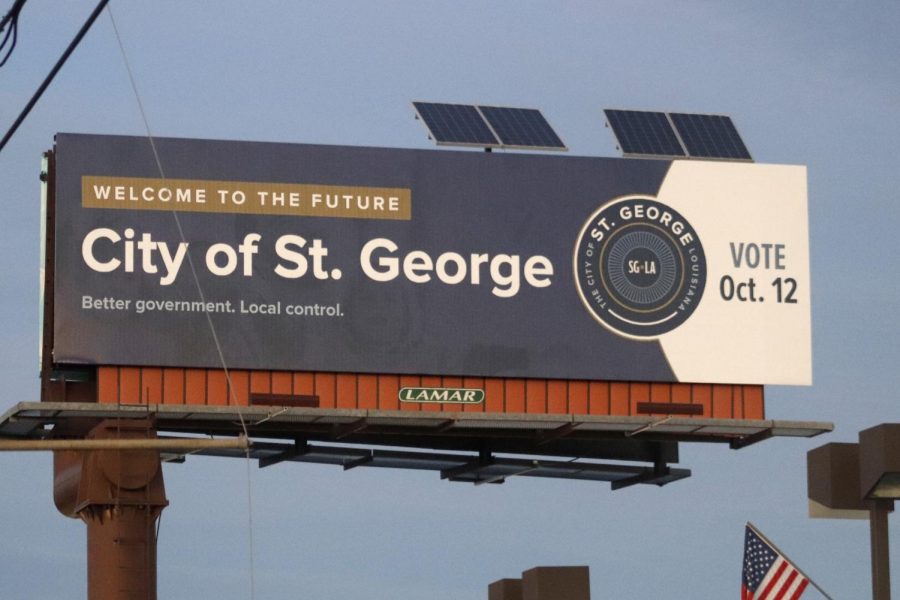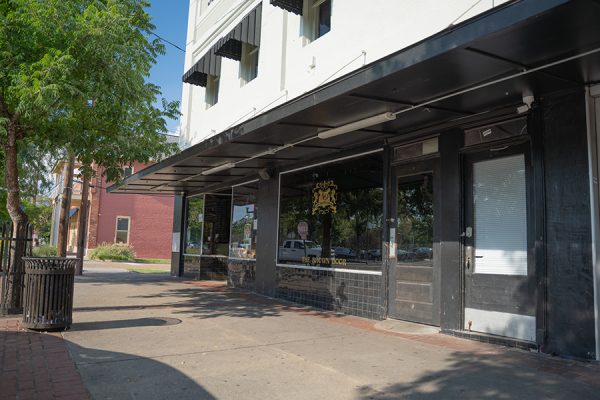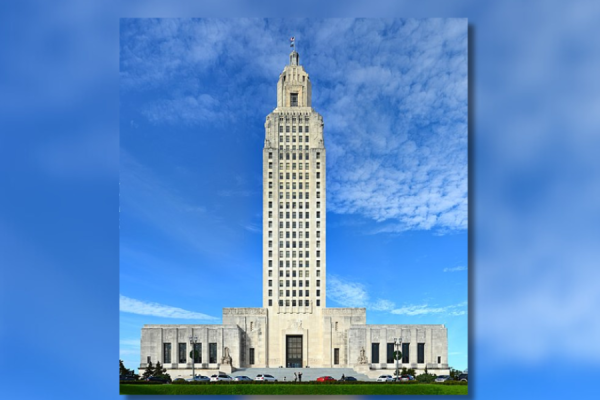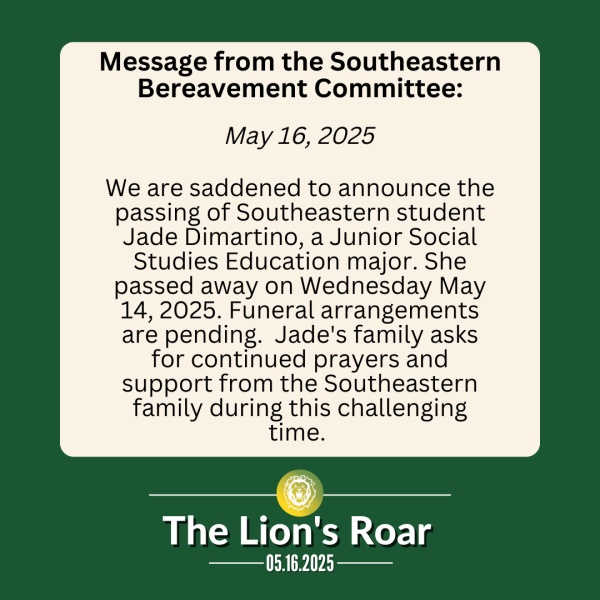Implications of City of St. George
Maggie Tregre /The Lion’s Roar
A sign on Siegan Lane near I-10 in Baton Rouge encouraged voters to pass the proposal for the City of St. George on Oct. 12. The proposal passed with 54% of voters supporting the new city.
A group of residents in East Baton Rouge Parish voted to create their own city that would be separate from Baton Rouge.
The proposed city, called St. George, passed with a 54 % of the vote on Oct. 12. Once incorporated, the city will surpass Lake Charles as the fifth largest city in Louisiana.
Peter Petrakis, associate professor of political science, explained the differences in reasoning for why the city is being created.
“Supporters will say it is about bringing sovereignty and control closer to residents,” explained Petrakis. “Moreover, many think that it will eventually lead to more control over services, especially public schools. Critics argue that it is akin to Balkanization or the fracturing of the city. I have heard claims of a struggle over ‘identity’ or the dissatisfaction some feel in terms of losing control of the city’s leadership positions. They want to be known as distinct from Baton Rouge residents.”
Supporters of St. George hope to create a smaller and more privatized system of government separate from that of Baton Rouge.
Munson Chauvin, instructor of political science, described the possible benefits and consequences of this type of system.
“Privatization usually leads to more efficiency and also sometimes more competition that could potentially lower the cost,” said Chauvin. “The advantages of that would be more choice and probably efficiency and more specialization. There are drawbacks to that at a government level too. Looking after your citizens, if you have the people who are able to vote, they’re the ones who make these decisions within these cities and therefore they might cater to the public more than a private company would.”
St. George would still be within the limits of East Baton Rouge Parish, meaning it would be under the same control of the parish president, Sharon Weston Broome, who also serves as mayor-president of Baton Rouge.
This is not the first time that Baton Rouge citizens has tried to form their own city. Chauvin explained how other cities have broken away from Baton Rouge in the past.
“You’ve had Central do the same thing in East Baton Rouge,” stated Chauvin. “From a political science standpoint, you have the state, and then the state basically has local government operate for it throughout the state. East Baton Rouge Parish is unique in the sense that you have the city of Baton Rouge and the parish politically being one in the same, so you have a mayor-president. Baton Rouge has rural areas, and some of these areas have broken off and formed their own cities, which is what they’re allowed to do.”
Those who oppose the creation of a new city have shown concern for how St. George is going to be properly funded. Petrakis described why those who are against the new city have voiced their concerns.
“Supporters claim that there will be sufficient savings that taxes might even go down,” said Petrakis. “Critics find those predictions too optimistic and that raising taxes will be inevitable. They also complain that the lack of specifics and, in their view, candor is deliberate in order to win the vote. After all, this is not a new movement but something supporters have been pursuing for years. Some Baton Rouge residents complain that something this important should not be left up to only part of the city’s voters—the vote was restricted to a very specific demographic area.”
The citizens of the proposed St. George also hope to form their own independent school district.
“East Baton Rouge Parish ranks 58 in a state with 64 parishes, so they’re saying, ‘We can do better than that,’” explained Chauvin. “Of course when they break away, it has the potential to harm the other side, ‘the part that’s left,’ you might say. But at the same time, the way that we have this system set up, we have laws that allow people to incorporate, and we put it to the voters.”
Although the vote passed for the creation of a new city, it would take several years before St. George officially breaks apart from Baton Rouge.
“In the future, who knows,” stated Chauvin. “I know that there are people right now who are trying to get back in Baton Rouge that are in this, and there’s actually a process that allows them to be annexed into Baton Rouge if they’re adjacent. The way a city grows is through annexation. There are some people who say if they can get enough signatures just like this process happened, they can possibly be annexed back into Baton Rouge. It’s certainly not a done deal.”
“Critics find those predictions too optimistic and that raising taxes will be inevitable. They also complain that the lack of specifics and, in their view, candor is deliberate in order to win the vote. After all, this is not a new movement but something supporters have been pursuing for years. Some Baton Rouge residents complain that something this important should not be left up to only part of the city’s voters—the vote was restricted to a very specific demographic area.”
The citizens of the proposed St. George also hope to form their own independent school district.
“East Baton Rouge Parish ranks 58 in a state with 64 parishes, so they’re saying, ‘We can do better than that,’” explained Chauvin. “Of course when they break away, it has the potential to harm the other side, ‘the part that’s left,’ you might say. But at the same time, the way that we have this system set up, we have laws that allow people to incorporate, and we put it to the voters.”
Although the vote passed for the creation of a new city, it would take several years before St. George officially breaks apart from Baton Rouge.
“In the future, who knows,” stated Chauvin. “I know that there are people right now who are trying to get back in Baton Rouge that are in this, and there’s actually a process that allows them to be annexed into Baton Rouge if they’re adjacent. The way a city grows is through annexation. There are some people who say if they can get enough signatures just like this process happened, they can possibly be annexed back into Baton Rouge. It’s certainly not a done deal.”
Your donation will support The Lion's Roar student journalists at Southeastern Louisiana University.
In addition, your contribution will allow us to cover our annual website hosting costs.
No gift is too small.

Maggie Tregre is an English education major from Baton Rouge, LA. She worked as a staff reporter and editor-in-training for The Lion's Roar from September...






